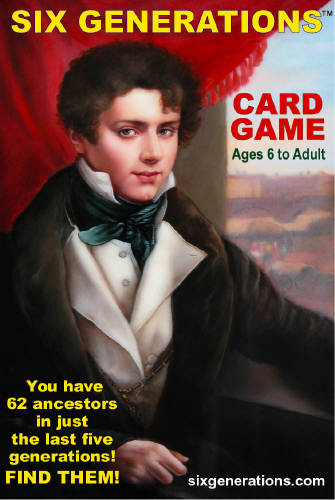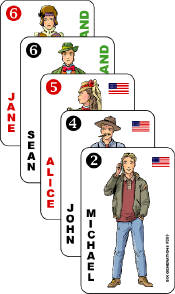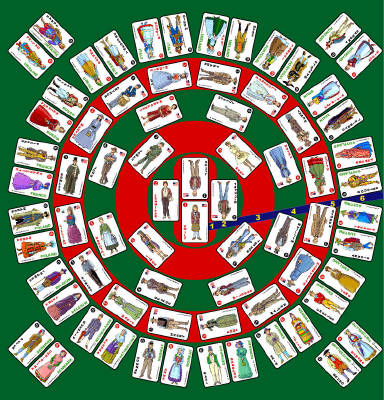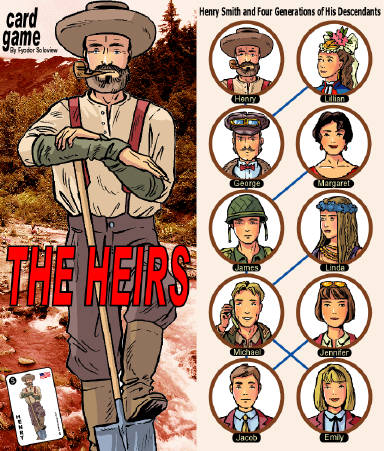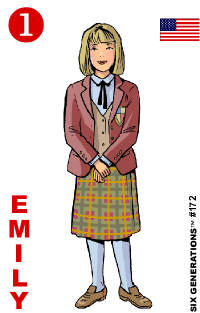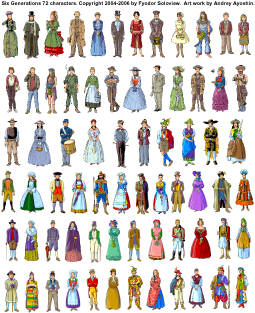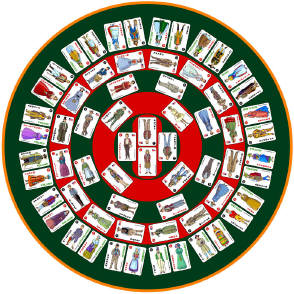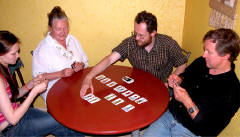




Six Generations is a renewed deck of multicultural playing cards, created with a help of a science, called genealogy. Genealogy, combining the knowledge in history and genetic about our families and ancestors, helps us to answer many questions of the present and the past. This is one that kind of question. Why do all regular playing cards have King, Queen and Jack as the only costumed characters?
The answer is: the playing cards have been created seven centuries ago in Europe during the monarchy, and no other family members could join the Royal family as an equal party. That's why other cards in the deck became the boring numbers, from two to ten.
The evolution of society made all people equal. But we were playing the old monarchic cards, and didn't really have a choice to follow the history... until now. We are happy to introduce new, democratic deck of playing cards for all your gaming needs. This is real revolution in card games!
This pack consists of 72 cards representing people of six generations. There are couples from 20 countries of early 19th century Europe and five generations of American descendants (16, 8, 4, 2 and 2 cards), the last generation of which is a brother and sister living at the start of the 21st century.
With this new deck of cards, the game players and inventors may create hundreds new card games. Please, read the rules of new card games and learn how to play, read the reviews about Six Generations playing cards, and check where to order them. And enjoy playing the card games with your friends, family and children!
ONE DECK OF CARDS - MANY GAMES
We make history fun, so kids will learn the history!
Six Generations Home Page >>> Games Description

NEW CARD GAMES, BASED ON "SIX GENERATIONS" PLAYING CARDS
SIX GENERATIONS
is an educational, family history and multicultural card game for people ages 6 and up. The game recreates for the players the history of the United States in the 19th and 20th centuries, following the period of European immigration to America.
One to 12 players compete to create a family tree of 64 characters spanning six generations.
While playing, the participants will come to realize how many people were responsible for their own heritage, and for their own culture and history.
Players will learn 72 most popular male and female first names, look at ethnic costumes of Europeans and Americans and memorize 20 European nations. In the corners of the cards are US flags, reflecting the number of stars and States that existed in that time era.
The root of the game is depictions of immigrant families who came from Europe to the United States in the first half of the 19th century. The later generations show their descendants from one generation to the next that ultimately are the ancestors of Emily and
Jacob
, brother and sister living in the United States of 2007. As the cards are played, these five generations of Emily and Jacob's ancestors will appear.
Players are dealt 6 cards each and take turns to add a person to the family tree, starting from the European generation and adding descendants, and drawing cards when unable to play.

THE HEIRS.
The Multimillion Dollar Inheritance, Left in 1917 By Californian Gold Miner to His Future Smartest Great-Great-Grandchild, Still Waits for the Winner.
Four generations
of Henry Smith's siblings have been waiting for 90 years, for only two of the qualified heirs, Emily and Jacob, brother and sister, to turn sixteen by 2006 and enter into genealogy battle with their numerous ancestors and trustees about what being the "smartest" heir means.
Henry Smith, who made his fortune by discovering gold in California during the Gold Rush and his future investments, signed his will in 1917 at the age of 86. With an unusual precision, he left his 35-year-old son George without the money.
Smith was angry that his son was not married, did not have siblings, and was planning to join the United States Army in the battlefield in Europe during WWI, where he could be possibly killed.
Instead, he signed his inheritance to some unknown great-great-grandchild, to be born in the future, and he died shortly afterward.
The judicial problem with selecting the right heir for billion-dollar assets is that the inheritance should be given to only one: the smartest child.
Rules of competition between Emily and Jacob have been set by the board of trustees, who might hold the funds until the contest is over. Emily and Jacob must square off to find the "smartest heir" - by winning the chess-style card game called "The Heirs".
AMERICA (sample)
ANCESTORS (sample)

FULL HOUSE (sample)
STRAIGHT (sample)
GENPOKER , as most of the Poker games, is a game of chance. The name "Genpoker" comes as a combination of two words: GENERATIONS and POKER. The major difference with Poker is: a card with lower number in Genpoker always has more value.
Genpoker is played with 64 cards from Six Generations deck. The cards are divided into six categories, or sets. Each category portrays a different generation. There are couples from 16 countries of early 19th century Europe (32 cards) and five generations of American descendants (16, 8, 4, 2 and 2 cards), the last generation of which is a brother and sister living at the start of the 21st century.
The cards are ranked (from high to low) Children (#1) - 2 cards, Parents (#2) - 2 cards, Grandparents (#3) - 4 cards, XX century (#4) - 8 cards, Victorian (#5) - 16 cards, and Europe (#6) - 32 cards. The cards are also divided into "Europeans" (32 cards #6), "Americans" ( 32 cards from #5 to #1); "Ancestors" (62 cards from #6 to #2), and "Children" (2 cards #1).
There are two suits: red (women) and black (men), 32 cards of each suit; however, no suit is higher than another. All Genpoker hands contain five cards, the highest hand wins. The cards with the lower numbers in Genpoker always have more value, than the cards with the higher numbers.
In the beginning of the game each player is dealt five cards. Then each player may discard up to 3 cards and get back from the deck as many cards as he/she discarded. After that the players are placing their five-card hand face up on the table and checking out who is the winner.
BLIND DATE. This game is the replica of the of famous card game "Old Maid".
Then each player from the left of the player, who discharged a card with Jacob, pulls the right neighbor`s card. Each time a player get a pair again, this pair need to be discharged.
The card with Emily can not be sloughed. Emily may change the victim during the game several times. In the end the loser has one card with Emily.

with 23
winning
scores.
23 CARD GAME
This is, probably, the only card game, which a few people standing across each other can play without having placed their cards on the desk or any flat surface.
The similar card games are: "21", "Black Jack", and "Pontoon". When playing this game, take away from the Six Generations deck any 8 cards with number 6.
One player (the dealer) deals
to each player four cards, and ask if they need more. The winner should have 23 scores.
After all other players stop asking for more cards, the dealer deals to himself.
Get over 23 - and you are an instant looser. If you have less than 23 - compete with other players and the dealer, who has the better score - closer to 23.
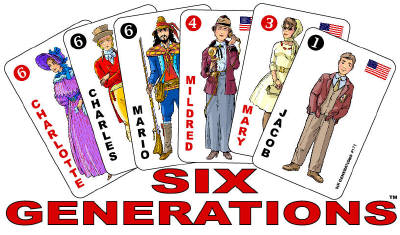

COUNTING. For 2-7 years old. Shuffle the deck and let the child to pick-up and count the numbers of any two, three or more cards. Ask your child to count the numbers from as many cards as possible. Total scores from all 72 cards are 370.
BOYS AND GIRLS.
For 2-4 years old. Shuffle the deck and let the children select boys and girls by placing them into two different packs. Check and explain if any mistakes have been made. There are 36 girls and 36 boys in the Six Generations deck.
Some other forms of educational activity for early child development might be created with Six Generations cards. Teach to use scissors by cutting off pictures from the cards.
Be creative! If you make the rules for some new card games or activity with Six Generations cards, let us know for posting them at this web-site.
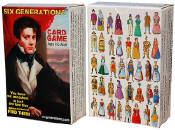
COMPLETE RULES of CARD GAMES >>>
